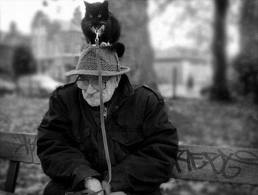I’m a graduate of a PhD program in English and Cultural Studies. My training was all about – well, most of the time – explaining why something was bad. Oversimplified! (see? I’m good at explaining why I’m bad, too). What it was about was cultivating my critical faculties. My ability to take something apart and show all the ways it was ‘problematic’. There’s a whole set of verbs you can use: problematize, trouble, unpack… all in an effort to have us reconsider the taken-for-granted and the assumed. Sometimes I worried – like L. – that I was being trapped in a culture of criticism that not only meant I had a harder time building or believing in something (that is, being earnest or sincere), but that I was only ever to think about the books I was reading in terms of ‘good’ books (those that were self-aware enough to know they were problematic) and those ‘bad’ books.
So I’m tempted to say that Fredrick Backman’s A Man Called Ove is problematic, but I’m not going to (even though I just did, see?). Instead I’ll say that it’s at once wonderfully enjoyable and a lesson in the conventions of best-selling novels: a story of a man who tries to kill himself because he’s grieving the death of his wife, but can’t kill himself because he finds purpose in building community (how’s that for the elevator pitch?).
The chapters read as headlines (“A Man Called Ove Finds a Screwdriver” “A Man Called Ove Buys Bread”) (which I recently learned is a pretty common strategy in writing a novel, to sketch out your chapters as newspaper headlines) and the narrative – in translation, no less – is funny, warm, cozy and safe. You’re meant to see Ove as his neighbours do, a crotchety old man who is actually the funny, warm, cozy and safe man that parallels his narrative.
It’s a book I’d suggest if you were worried that living in your townhouse in the suburbs was making you less community-focused. Or if you thought that maybe you couldn’t have intergenerational friendships. Or if you were concerned that you were xenophobic or homophobic (or that maybe your granddad was). It’s a book that takes any worry you might have about your existence – or modern life – and banishes it away with the calmest, safest, warmest, funniest, hug-of-sentimentality.
It’s a book you’ll read and you’ll cry in your oatmeal. You’ll be glad you read it for the warmth it gave you all day. You’ll read it knowing there are problems with the narrative construction, with the character, with the politics of the text, but you won’t mind because it makes you feel so good. And whether that makes the book itself good or bad, I’m not one to say. I think there are some occasions (certainly not all, let’s not get carried away), when it’s okay to enjoy a book because it’s enjoyable. And this one really is.

I look forward to reading it! Great review!
Thanks mum 🙂 I wonder what it says when you’re mum’s the only one to reply to your blog posts…
I heard she prints them out for her fridge
Pingback: Cottage Reads 2015 | Literary Vice
Pingback: Bear Town: Almost as bad as being alone with my thoughts | Literary Vice
Pingback: The Last Chance Library: Snuggly and soothing and aren’t libraries the best | Literary Vice